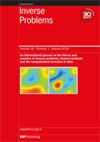Optimal design of large-scale nonlinear Bayesian inverse problems under model uncertainty
IF 2
2区 数学
Q1 MATHEMATICS, APPLIED
引用次数: 0
Abstract
We consider optimal experimental design (OED) for Bayesian nonlinear inverse problems governed by partial differential equations (PDEs) under model uncertainty. Specifically, we consider inverse problems in which, in addition to the inversion parameters, the governing PDEs include secondary uncertain parameters. We focus on problems with infinite-dimensional inversion and secondary parameters and present a scalable computational framework for optimal design of such problems. The proposed approach enables Bayesian inversion and OED under uncertainty within a unified framework. We build on the Bayesian approximation error (BAE) approach, to incorporate modeling uncertainties in the Bayesian inverse problem, and methods for A-optimal design of infinite-dimensional Bayesian nonlinear inverse problems. Specifically, a Gaussian approximation to the posterior at the maximum a posteriori probability point is used to define an uncertainty aware OED objective that is tractable to evaluate and optimize. In particular, the OED objective can be computed at a cost, in the number of PDE solves, that does not grow with the dimension of the discretized inversion and secondary parameters. The OED problem is formulated as a binary bilevel PDE constrained optimization problem and a greedy algorithm, which provides a pragmatic approach, is used to find optimal designs. We demonstrate the effectiveness of the proposed approach for a model inverse problem governed by an elliptic PDE on a three-dimensional domain. Our computational results also highlight the pitfalls of ignoring modeling uncertainties in the OED and/or inference stages.模型不确定条件下大规模非线性贝叶斯逆问题的优化设计
我们考虑了在模型不确定的情况下,由偏微分方程(PDEs)控制的贝叶斯非线性逆问题的最优实验设计(OED)。具体来说,我们考虑的反演问题中,除了反演参数外,支配偏微分方程的还包括次要不确定参数。我们将重点放在具有无限维反演和次要参数的问题上,并为此类问题的优化设计提出了一个可扩展的计算框架。所提出的方法可在统一框架内实现不确定条件下的贝叶斯反演和 OED。我们以贝叶斯近似误差(BAE)方法为基础,将建模不确定性纳入贝叶斯反演问题,并提出了无穷维贝叶斯非线性反演问题的 A 优化设计方法。具体来说,最大后验概率点的后验高斯近似用于定义不确定性感知 OED 目标,该目标易于评估和优化。特别是,OED 目标的计算成本(PDE 求解次数)不会随着离散反演和次要参数维度的增加而增加。OED 问题被表述为一个二元双级 PDE 受限优化问题,而贪婪算法提供了一种务实的方法,用于寻找最优设计。我们在三维域上演示了由椭圆 PDE 控制的模型逆向问题的拟议方法的有效性。我们的计算结果还强调了在 OED 和/或推理阶段忽略建模不确定性的缺陷。
本文章由计算机程序翻译,如有差异,请以英文原文为准。
求助全文
约1分钟内获得全文
求助全文
来源期刊

Inverse Problems
数学-物理:数学物理
CiteScore
4.40
自引率
14.30%
发文量
115
审稿时长
2.3 months
期刊介绍:
An interdisciplinary journal combining mathematical and experimental papers on inverse problems with theoretical, numerical and practical approaches to their solution.
As well as applied mathematicians, physical scientists and engineers, the readership includes those working in geophysics, radar, optics, biology, acoustics, communication theory, signal processing and imaging, among others.
The emphasis is on publishing original contributions to methods of solving mathematical, physical and applied problems. To be publishable in this journal, papers must meet the highest standards of scientific quality, contain significant and original new science and should present substantial advancement in the field. Due to the broad scope of the journal, we require that authors provide sufficient introductory material to appeal to the wide readership and that articles which are not explicitly applied include a discussion of possible applications.
 求助内容:
求助内容: 应助结果提醒方式:
应助结果提醒方式:


